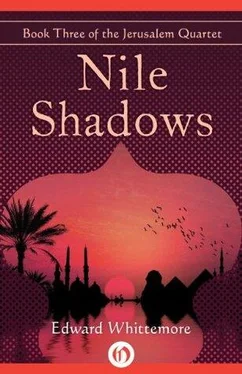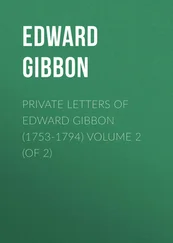The first shots ripped into his side and fluttered his jacket, spinning him around so that he was facing the room when the next bullets hit him, before a submachine gun roared and exploded into the middle of him, ending it all and nearly cutting him in half, collapsing his small thin body and sending it flying back through the doors to the edge of the river. . a twisted heap of old clothes on the wooden slats of the little veranda, one hand trailing in the water.
The men went quickly about their business. They gathered up the body in a canvas sack and in another moment there was no one in the airy sunroom but the two tiny ancient women, alone once more with the haunting wicker shapes of memory.
Little Alice quietly sobbing in the stillness. . Big Belle gazing steadfastly at the shattered glass doors and the silent river, at the huge empty vista where Joe had been. . desolate now and passing.
— 20-
A Gift of Faces, a Gift of Tongues
Early evening, the day after Stern had been killed.
The Major stood behind his desk in the Third Circle of the Irrigation Works, the headquarters of the intelligence unit referred to as the Waterboys. He had just returned from a meeting in the Colonel's office, where the two of them had discussed the information acquired that afternoon in a Cairo slum by one of their better local agents, code name Jameson, an Egyptian blackmarketeer with yellowish teeth and a bad liver.
From conversations with the Arab owner of the bar where Stern had been killed, Jameson had been able to elicit a surprising amount of information on the behavior of Stern and his unidentified companion, prior to the explosion of the hand grenade at midnight. This information, in turn, had led the Colonel to make a number of intriguing suppositions about the case. And since the Colonel had known Stern personally and had worked with him in the past, it was only to be expected that his questions would follow certain lines.
Why had the Monastery been running an operation against Stern?
What had been the nature of the operation?
Bletchley had given the agent working against Stern a Purple Seven designation, the most sensitive of all the categories. Why the need for this extraordinary secrecy? What made the case so important it had required a Purple Seven agent?
Further, the agent in question had been brought in by Bletchley from the outside, although a Purple Seven designation was so sensitive it was almost never assigned to someone from the outside. Why had it been done in this case? How had Bletchley been able to convince London that it was necessary?
Was it true, as the Colonel suspected, that this Purple Seven agent had to be someone who had known Stern well in the past? Again, that he must be someone who had also once been closely involved with an employee of the Waterboys who had been a longtime friend of Stern, the American woman Maud?
And finally and most intriguing of all to the Colonel, what events from the past lay behind the unlikely connections that had existed among these three people?
For the connections did seem unlikely.
Maud. An American who had lived in Greece and Turkey before the war. A likable hardworking woman, trusted and thoroughly commonplace to all appearances, a translator in the Third Circle of the Irrigation Works.
Stern. A wizard of languages and Levantine ways. A brilliant agent who had used his vast knowledge of the Middle East to come and go unsuspected for years. A solitary man who had ingeniously used his role as a minor gunrunner to conceal his espionage activities, who had managed through this sordid cover to escape important notice throughout his life.
And lastly, the mysterious Purple Seven. An experienced agent from the outside, identity unknown, history and previous involvements unknown. Evidently a European but referred to by the Colonel as the Armenian, because the false papers of his Purple Seven cover carried an Armenian name and an Armenian background.
When the Major thought about it, it wasn't difficult for him to understand why the Colonel's questions took the form they did. The Colonel had spent most of his life in the Middle East and despite his ordinary army manner, he was a scholarly expert in the cultures of the region who couldn't help but be intrigued by the contradictions of Stern's obscure past.
Then too, in Stern's case, it wasn't just a matter of facts and straightforward information. From the way the Colonel and others spoke of Stern, it was apparent Stern had been the kind of man who had invariably had a powerful effect on anyone who knew him. Almost an hypnotic effect, it seemed, as if in the process of uncovering the truth about Stern it was possible to discover a much larger truth. Almost as if some secret meaning lay hidden in Stern's lifelong journey in search of his arcane goals.
It was only a vague notion to the Major, but he knew that was because he had never met Stern and been exposed to his influence. From the way the Colonel spoke of Stern, even from certain references in the files, it was easy enough to imagine the aura that had surrounded Stern, the peculiar mixture of strangeness and recognition men had felt in his presence, a sense of wonder and familiarity and of profound fear as well.
An age-old tragedy, then, Stern's life. A tale of idealism and disaster on the shores of the Aegean that would always be unresolvable in its depths of darkness and light, a fated play of mystery and suffering in the stony deserts where certain men had always wandered. In its yearnings and its abject failures, a tale on the nature of things, its rhythms spun from the soft roll of ancient seas and the hard tides of ancient deserts. And yet a tale so simple it was known to the poorest of beggars and had been for thousands of years. . its stark cycle always secretly felt in the heart, always secretly passed from heart to heart through the millennia.
***
Although the Major could appreciate the profound fascination felt by the Colonel for Stern's enigmatic life and death, his own imagination was more deeply provoked by the unidentified figure in the case. The man who had been brought in to uncover the truth about Stern, the elusive Purple Seven agent known as the Armenian.
Nor was it difficult for the Major to understand his own particular fascination with this other figure. For the man's Purple Seven identity had been used only once before, and that was by the professional agent who had designed the identity for himself in the 1930s and used it so successfully in Palestine and Ethiopia, the same man who had been the hero of the Major's youth during the First World War, Columbkille O'Sullivan or Our Colly of Champagne, the legendary little sergeant who had survived a bullet through the heart in 1914 and been awarded two Victoria Crosses, an impossible feat.
All his life the Major had wondered about Our Colly. What kind of man could he have been and how could anyone be expected to follow in his footsteps? Why would anyone, in fact, even dare to presume such a thing?
And yet Bletchley had done just that. Bletchley had gone out of his way to assign Our Colly's Purple Seven identity to this unknown agent who had been tracking Stern for months or years and had even been with Stern, finally, at the moment of his death.
So the circle was complete and the Major was brought back to the puzzle of the unknown Armenian, sketchily described as a small dark man with a deeply lined face and watchful eyes, wearing a torn collarless shirt and an old dark suit that was too big for him, that looked as if it might be secondhand, not even his to begin with. An apparent dealer in Coptic artifacts. An unknown man in transit, as Our Colly once had been.
***
Читать дальше












